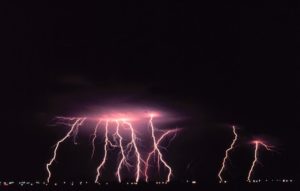Spring is going to be here before we know it and as beautiful as that time of year is, it is also prime time for severe weather.
Severe weather such as thunderstorms, floods, and tornadoes can cause nightmares for homeowners and homesteaders.
Here in the Ozarks, we are prone to severe thunderstorms, lightning, hail, and the dreaded tornado. We have them often and it’s easy to just ignore the warnings. I am guilty of ignoring warnings and not taking them seriously. I suggest you NOT ignore the warning and get prepared for the worst because they are coming.
It doesn’t take a lot of time or money to get prepared, most of us have these items already and if you’re a camper, I’m sure you already have many of the items below.
Severe weather can happen anywhere and at any time, so I have put together an extensive severe weather checklist with some emergency tips to help you get through the storms when the thunder rolls.
In addition to the items you should keep on hand, there are a few actions you need to take before storm season and when you get the alert that severe weather is headed your way.
What Are My Chances of Experiencing Severe Weather?
According to noaa.gov, “Worldwide, there are an estimated 16 million thunderstorms each year, and at any given moment, there are roughly 2,000 thunderstorms in progress. There are about 100,000 thunderstorms each year in the U.S. alone. About 10% of these reach severe levels.”
- Thunderstorm Watch: conditions are favorable for severe weather to pop up
- Thunderstorm Warning: severe weather has been sighted in your area, take precautions and find shelter
Types of Severe Weather Associated with Spring Storms
- Wind
- Hail
- Flooding
- Lightening

Powerful winds associated with thunderstorms and tornadoes can take down large trees and wreak havoc on your home. Winds can damage roofs, siding and outbuildings so make sure you have a plan to batten down the hatches before the storm.
Hail is extremely dangerous and can completely destroy a roof and the nice paint job on your new car. If possible, park vehicles in the garage or cover them with a heavy duty tarp. Don’t park them under or near trees, limbs (widow makers) can fall and damage anything below.
Flooding is a major concern especially for those near creeks and rivers. We have floods here every year and some have been historic. Floods have killed many people who thought they were prepared and destroyed millions of dollars in property.
NEVER drive across running water no matter how well you know the roads in your area.
Lightening is sometimes underrated, especially by younger folks. It can kill you and if you see it or hear thunder, even if it’s miles away, take cover immediately. Lightning has killed and injured many and is responsible for starting many home fires.
Spring Severe Weather Tips and To Do’s
Things to do Before Spring Storm Season
Now that we are entering the Spring severe weather season, there are a few things you can do to make sure you are prepared and can manage if you find yourself in the path of a severe storm.

Take action now. Develop an emergency plan that takes into account your local weather hazards and then rehearse your plan often.
- Create a family emergency plan
- How to manage if you are staying put
- What to do if you must get out due to flooding or fire
- Create a meeting point if you get split up
- Stay updated on emergency alerts, check out these free emergency alert apps
- Secure everything before the storm hits
- Top off and check your emergency kits (see below)
- Gather important family documents: birth certificates, passports, tax papers, and insurance documents. Keep them in a secure and water proof area that is accessible in a high stress situation.
- Check and re-check communication devices and backup communication
- Check your fire extinguishers and make sure they are full and operable.
Things to do When You Know Severe Weather Is Immanent
- Visit the ATM and get backup cash
- Fill all your vehicles with fuel
- Top off your windshield washer fluid
- Fill all gas cans for backup generator fuel
- Get your prescriptions refilled if possible (ask your physician or pharmacist about storing prescription medications and try to get 90-day fills if possible)
- Wash clothes, do dishes and anything else that will take a lot water then fill the bathtub with water
- Gather warm clothes, blankets, sleeping bags, portable heaters and other essentials
Things to Check Before Severe Weather Hits
Check your generators and fill them with fuel. Start them up and make sure they are in working order.
Walk around your property and secure any loose items that may blow away or cause more damage during high winds.
Get your chainsaws fueled up and blade sharp. You never know when a tree may come down during a storm.
Charge all your electronic devices and get extra batteries within easy reach.
If you have wood heat or cook with wood, move some firewood indoors/garage to keep it dry.
Check your portable heaters and get them in a dry place. Make sure you have enough propane or other fuel on hand in case you can’t leave after the storm.
Emergency Storm Preparedness Checklist

Must of us as preppers have a bug out bag (BOB) , get home bag (GHB) or other type of emergency bag already prepared for emergencies. This list will be redundant to some, but I am going to focus on severe storm prepping.
This kit will contain some basic items that will help keep you and your family safe and more comfortable during and after a severe storm. Check your kit often and change out itmes that are no longer needed because of the season changes. Keep them in a place where you can access them easily and quickly.
- Water – one gallon of water per person per day for at least three days, for drinking and sanitation, see my article on water storage
- Food – at least a three-day supply of non-perishable food, see my article on long term food storage
- Battery powered or hand crank radio with a NOAA Weather Radio
- Flashlight and/or headlamp
- First aid kit
- Extra batteries
- Whistle to signal for help
- Dust mask to filter contaminated air
- Plastic sheeting
- Duct tape
- Tarp for wind/hail damage
- Moist towelettes, garbage bags and plastic ties for personal sanitation
- Wrench or pliers to turn off utilities: gas and water
- Manual can opener for food
- Local maps
- Cell phone with chargers and a backup battery
- Prescription medications
- Non-prescription medications:
- pain relievers
- anti-diarrhea medication
- antacids
- laxatives
- Glasses and contact lenses solution
- Infant formula, bottles, diapers, wipes, diaper rash cream
- Pet food and extra water for your pet
- Sleeping bag or warm blanket for each person
- Complete change of clothing appropriate for your climate and sturdy shoes
- Household chlorine bleach (unscented) and medicine dropper to disinfect water
- Fire extinguisher ABC type
- Matches in a waterproof container, lighters or ferro rod
- Feminine supplies and personal hygiene items
- Pots, pans, paper cups, plates, paper towels and plastic utensils
- Paper and pencil
- Needle and thread
- Books, games, puzzles or other activities for children
- See our emergency supply list for your vehicle
Finally, What to do After Severe Weather Hits
After the storm has cleared your area and you find it safe to venture outdoors, be sure to check on neighbors who may require special assistance, especially those that have infants, disabilities and the elderly.
Do NOT go near downed power lines and call your utility company immediately. Don’t assume that the danger has passed, continue to monitor NOAA Weather Radio and your local media for up-to-date weather alerts.
I like to keep seasonal emergency gear in plastic tubs clearly labeled with the season, especially winter and spring.
I hope this checklist encourages you to get prepared for the spring storm season.
Primacare KB-9005 First Aid Flashlight Emergency Preparedness Kit for Disasters, Survival, Traveling, Camping, Hiking, Home and Office, 42 Pieces White
30% OffEVERLIT 250 Pieces Survival First Aid Kit IFAK EMT Molle Pouch Survival Kit Outdoor Gear Emergency Kits Trauma Bag for Camping Boat Hunting Hiking Home Car Earthquake and Adventures
20% OffAuto Amazon Links: No products found. No products found.
Auto Amazon Links: No products found. No products found.












